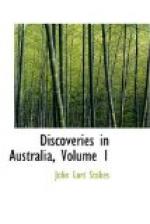The master then, assisted by those who remained, attempted to make a raft, which was not completed before the expiration of seven days. During this interval they had managed to distil the contents of a cask and some bottles of water from the sea, by the aid of the ship’s coppers, and a leaden pipe from the quarter gallery cistern, the whole of which they placed on the raft with a basket containing beer, and a cask of pork. Whilst they were on the wreck they were upon a daily allowance of two wine glasses of distilled water, and a few pieces of damaged biscuit.
As soon as the raft was completed, they got upon it, but finding that it was not buoyant enough to hold them, they threw over the water the pork and beer. Still it did not support their weight, so the greater number returned on board; leaving Mr. Moore the master, Mr. Grant the surgeon, Captain and Mrs. D’Oyly, and their two children, their nurse, a native of India, and Mr. Armstrong, passengers; also two seamen, named Lounce and Berry, who determined to remain upon it all night. In the morning, however, it was found that the rope by which the raft had been made fast to the stern of the wreck had been cut, and nothing was seen of their companions. It is probable that the uncomfortable situation in which they found themselves, up to their waists in water, and the sea constantly breaching over them, induced the master to cut the rope and trust to Providence to guide himself and the passengers to some place of safety.
Those that remained then made another raft of the vessel’s topmasts lashed together with coir rope, and made a sail out of some cloth which formed a part of her cargo. It took seven days before it was completed, when they launched off and bid adieu to the ill-fated vessel, which was probably soon broken up, for at high-water the sea breached over her.
The vessel that was seen with her masts standing, was too far to windward for them to reach, for even the boat could not make way against the wind and current. Upon casting off, they set their sail and steered before the wind, but the raft was so heavy and deep that very little progress was made. She drifted rather than sailed, and probably did not go more than a mile or one mile and a half an hour. After some time they came to a reef upon which they remained for the night, and the next morning proceeded before the wind, but saw no more reefs.
After being two days and nights upon the raft, up to their waists in water, and partaken of very little food, they passed an island, and then saw several more ahead. Soon afterwards a canoe was perceived paddling towards them, containing ten or twelve Indians, who as they approached stood up and extended their arms to show they had no weapons and were inclined to be friendly. On reaching the raft the Indians got upon it, and conducted themselves very peaceably; and after a short time proposed that they should leave the raft and go into the canoe, which they at first




